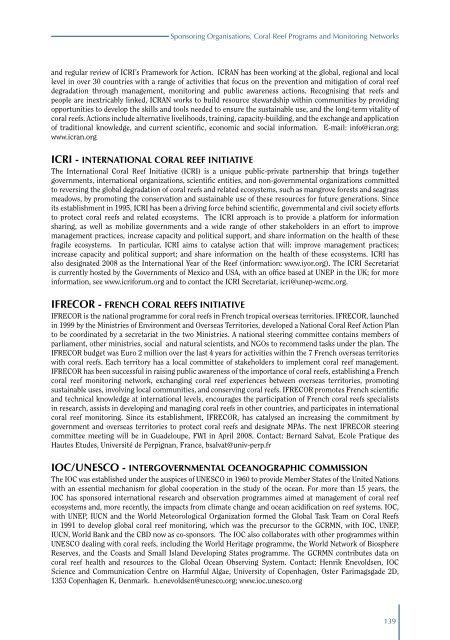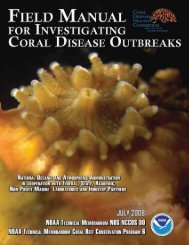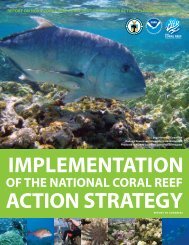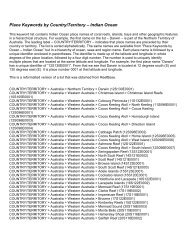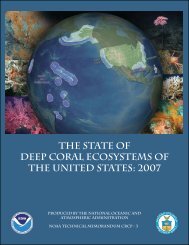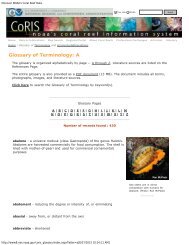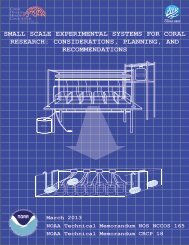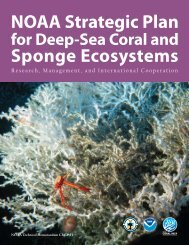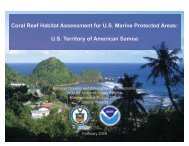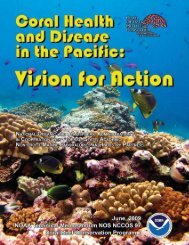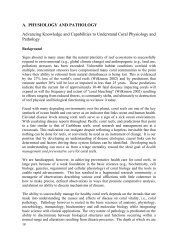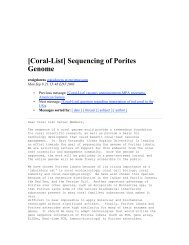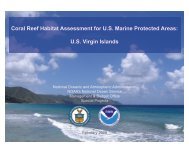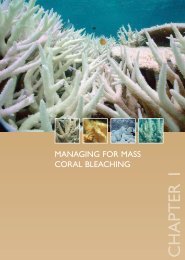Status of Caribbean coral reefs after bleaching and hurricanes in 2005
Status of Caribbean coral reefs after bleaching and hurricanes in 2005
Status of Caribbean coral reefs after bleaching and hurricanes in 2005
You also want an ePaper? Increase the reach of your titles
YUMPU automatically turns print PDFs into web optimized ePapers that Google loves.
Sponsor<strong>in</strong>g Organisations, Coral Reef Programs <strong>and</strong> Monitor<strong>in</strong>g Networks<strong>and</strong> regular review <strong>of</strong> ICRI’s Framework for Action. ICRAN has been work<strong>in</strong>g at the global, regional <strong>and</strong> locallevel <strong>in</strong> over 30 countries with a range <strong>of</strong> activities that focus on the prevention <strong>and</strong> mitigation <strong>of</strong> <strong>coral</strong> reefdegradation through management, monitor<strong>in</strong>g <strong>and</strong> public awareness actions. Recognis<strong>in</strong>g that <strong>reefs</strong> <strong>and</strong>people are <strong>in</strong>extricably l<strong>in</strong>ked, ICRAN works to build resource stewardship with<strong>in</strong> communities by provid<strong>in</strong>gopportunities to develop the skills <strong>and</strong> tools needed to ensure the susta<strong>in</strong>able use, <strong>and</strong> the long-term vitality <strong>of</strong><strong>coral</strong> <strong>reefs</strong>. Actions <strong>in</strong>clude alternative livelihoods, tra<strong>in</strong><strong>in</strong>g, capacity-build<strong>in</strong>g, <strong>and</strong> the exchange <strong>and</strong> application<strong>of</strong> traditional knowledge, <strong>and</strong> current scientific, economic <strong>and</strong> social <strong>in</strong>formation. E-mail: <strong>in</strong>fo@icran.org;www.icran.orgICRI - INTERNATIONAL CORAL REEF INITIATIVEThe International Coral Reef Initiative (ICRI) is a unique public-private partnership that br<strong>in</strong>gs togethergovernments, <strong>in</strong>ternational organizations, scientific entities, <strong>and</strong> non-governmental organizations committedto revers<strong>in</strong>g the global degradation <strong>of</strong> <strong>coral</strong> <strong>reefs</strong> <strong>and</strong> related ecosystems, such as mangrove forests <strong>and</strong> seagrassmeadows, by promot<strong>in</strong>g the conservation <strong>and</strong> susta<strong>in</strong>able use <strong>of</strong> these resources for future generations. S<strong>in</strong>ceits establishment <strong>in</strong> 1995, ICRI has been a driv<strong>in</strong>g force beh<strong>in</strong>d scientific, governmental <strong>and</strong> civil society effortsto protect <strong>coral</strong> <strong>reefs</strong> <strong>and</strong> related ecosystems. The ICRI approach is to provide a platform for <strong>in</strong>formationshar<strong>in</strong>g, as well as mobilize governments <strong>and</strong> a wide range <strong>of</strong> other stakeholders <strong>in</strong> an effort to improvemanagement practices, <strong>in</strong>crease capacity <strong>and</strong> political support, <strong>and</strong> share <strong>in</strong>formation on the health <strong>of</strong> thesefragile ecosystems. In particular, ICRI aims to catalyse action that will: improve management practices;<strong>in</strong>crease capacity <strong>and</strong> political support; <strong>and</strong> share <strong>in</strong>formation on the health <strong>of</strong> these ecosystems. ICRI hasalso designated 2008 as the International Year <strong>of</strong> the Reef (<strong>in</strong>formation: www.iyor.org). The ICRI Secretariatis currently hosted by the Governments <strong>of</strong> Mexico <strong>and</strong> USA, with an <strong>of</strong>fice based at UNEP <strong>in</strong> the UK; for more<strong>in</strong>formation, see www.icriforum.org <strong>and</strong> to contact the ICRI Secretariat, icri@unep-wcmc.org.IFRECOR - FRENCH CORAL REEFS INITIATIVEIFRECOR is the national programme for <strong>coral</strong> <strong>reefs</strong> <strong>in</strong> French tropical overseas territories. IFRECOR, launched<strong>in</strong> 1999 by the M<strong>in</strong>istries <strong>of</strong> Environment <strong>and</strong> Overseas Territories, developed a National Coral Reef Action Planto be coord<strong>in</strong>ated by a secretariat <strong>in</strong> the two M<strong>in</strong>istries. A national steer<strong>in</strong>g committee conta<strong>in</strong>s members <strong>of</strong>parliament, other m<strong>in</strong>istries, social <strong>and</strong> natural scientists, <strong>and</strong> NGOs to recommend tasks under the plan. TheIFRECOR budget was Euro 2 million over the last 4 years for activities with<strong>in</strong> the 7 French overseas territorieswith <strong>coral</strong> <strong>reefs</strong>. Each territory has a local committee <strong>of</strong> stakeholders to implement <strong>coral</strong> reef management.IFRECOR has been successful <strong>in</strong> rais<strong>in</strong>g public awareness <strong>of</strong> the importance <strong>of</strong> <strong>coral</strong> <strong>reefs</strong>, establish<strong>in</strong>g a French<strong>coral</strong> reef monitor<strong>in</strong>g network, exchang<strong>in</strong>g <strong>coral</strong> reef experiences between overseas territories, promot<strong>in</strong>gsusta<strong>in</strong>able uses, <strong>in</strong>volv<strong>in</strong>g local communities, <strong>and</strong> conserv<strong>in</strong>g <strong>coral</strong> <strong>reefs</strong>. IFRECOR promotes French scientific<strong>and</strong> technical knowledge at <strong>in</strong>ternational levels, encourages the participation <strong>of</strong> French <strong>coral</strong> <strong>reefs</strong> specialists<strong>in</strong> research, assists <strong>in</strong> develop<strong>in</strong>g <strong>and</strong> manag<strong>in</strong>g <strong>coral</strong> <strong>reefs</strong> <strong>in</strong> other countries, <strong>and</strong> participates <strong>in</strong> <strong>in</strong>ternational<strong>coral</strong> reef monitor<strong>in</strong>g. S<strong>in</strong>ce its establishment, IFRECOR, has catalysed an <strong>in</strong>creas<strong>in</strong>g the commitment bygovernment <strong>and</strong> overseas territories to protect <strong>coral</strong> <strong>reefs</strong> <strong>and</strong> designate MPAs. The next IFRECOR steer<strong>in</strong>gcommittee meet<strong>in</strong>g will be <strong>in</strong> Guadeloupe, FWI <strong>in</strong> April 2008. Contact: Bernard Salvat, Ecole Pratique desHautes Etudes, Université de Perpignan, France, bsalvat@univ-perp.frIOC/UNESCO - INTERGOVERNMENTAL OCEANOGRAPHIC COMMISSIONThe IOC was established under the auspices <strong>of</strong> UNESCO <strong>in</strong> 1960 to provide Member States <strong>of</strong> the United Nationswith an essential mechanism for global cooperation <strong>in</strong> the study <strong>of</strong> the ocean. For more than 15 years, theIOC has sponsored <strong>in</strong>ternational research <strong>and</strong> observation programmes aimed at management <strong>of</strong> <strong>coral</strong> reefecosystems <strong>and</strong>, more recently, the impacts from climate change <strong>and</strong> ocean acidification on reef systems. IOC,with UNEP, IUCN <strong>and</strong> the World Meteorological Organization formed the Global Task Team on Coral Reefs<strong>in</strong> 1991 to develop global <strong>coral</strong> reef monitor<strong>in</strong>g, which was the precursor to the GCRMN, with IOC, UNEP,IUCN, World Bank <strong>and</strong> the CBD now as co-sponsors. The IOC also collaborates with other programmes with<strong>in</strong>UNESCO deal<strong>in</strong>g with <strong>coral</strong> <strong>reefs</strong>, <strong>in</strong>clud<strong>in</strong>g the World Heritage programme, the World Network <strong>of</strong> BiosphereReserves, <strong>and</strong> the Coasts <strong>and</strong> Small Isl<strong>and</strong> Develop<strong>in</strong>g States programme. The GCRMN contributes data on<strong>coral</strong> reef health <strong>and</strong> resources to the Global Ocean Observ<strong>in</strong>g System. Contact: Henrik Enevoldsen, IOCScience <strong>and</strong> Communication Centre on Harmful Algae, University <strong>of</strong> Copenhagen, Oster Farimagsgade 2D,1353 Copenhagen K, Denmark. h.enevoldsen@unesco.org; www.ioc.unesco.org139


